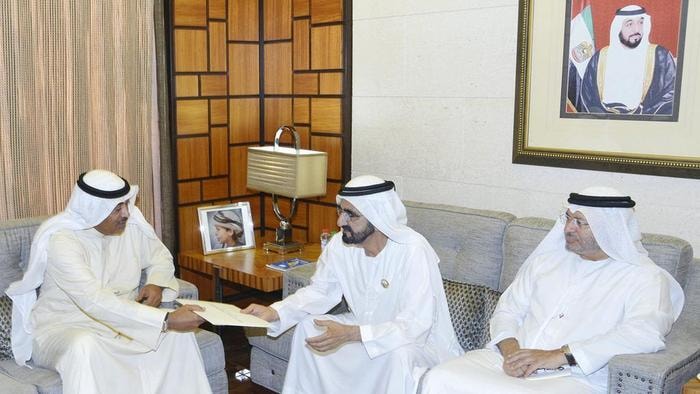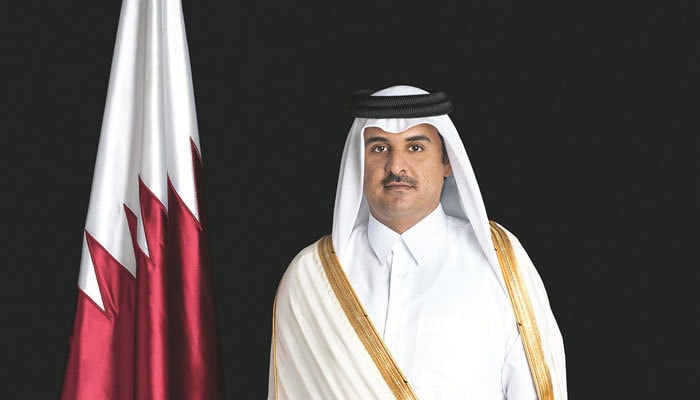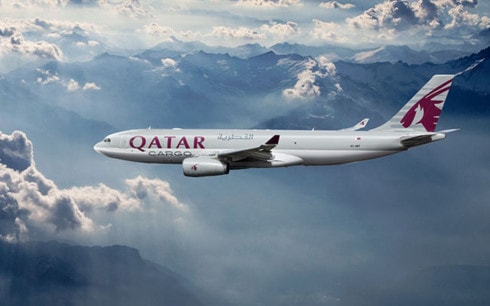Kuwait tries to break deadlock in Gulf crisis
(Baonghean.vn) - After more than two months of the Gulf diplomatic crisis, Kuwait has just started a new reconciliation effort with the visit of its Foreign Minister to four countries: Saudi Arabia, the United Arab Emirates, Egypt and Oman.
Analysts say Kuwait's reconciliation move this time is relatively promising as it receives stronger support from the US - a country with great influence on the Gulf countries that are besieging and isolating Qatar.
 |
| Kuwait's Foreign Minister (left) hands over a handwritten letter from the King of Kuwait to the Deputy Prime Minister of the United Arab Emirates (center). Photo: Kuwait News Agency |
The Kuwait Difference
Kuwait's delegation to the Gulf countries this time includes many senior members of the Royal Family led by Foreign Minister Sheikh Sabah al-Khalid al-Sabah.
During meetings with leaders of host countries, Sheikh Sabah al-Khalid al-Sabah handed over a handwritten letter from Kuwaiti Emir Sheikh Sabah Al-Ahmad Al-Jaber Al-Sabah to these countries, expressing his desire to find a solution to the Gulf diplomatic crisis that has been in a deadlock for many weeks.
Although details were not released, some sources said the letter mentioned the brotherly relationship of Arab countries, the cooperation and development process of the Gulf Cooperation Council as well as the negative impacts of recent developments in the region.
Although many high-ranking officials from many countries have come to the Gulf region to act as mediators, such as US Secretary of State Rex Tillerson, French President Emmanuel Macron or Turkish President Tayyip Erdogan, the difference in this visit of Kuwaiti Foreign Minister al-Khalid al-Sabah is to promote a direct dialogue between Qatar on one side and the four Gulf countries including Saudi Arabia, the United Arab Emirates, Bahrain and Egypt on the other.
The handwritten letter sent by the Emir of Kuwait to the leaders of the Gulf countries wants these countries to clearly state once again the demands they want Qatar to implement, the issues on which these countries cannot compromise. The Arab countries' responses to the Emir of Kuwait will be forwarded to Qatar so that it can give its position in discussing these demands.
The biggest difficulty facing Kuwait's mediation role now is that, despite its willingness to negotiate, both Qatar and the Gulf countries have set preconditions for such negotiations.
While the Gulf countries have demanded that Qatar implement a “statement of demands” before negotiations can begin, Qatar has also refused any negotiations before the blockade against the country is lifted. Analysts say Kuwait needs to overcome this “bottleneck” to prove its effectiveness as a mediator.
 |
| Kuwaiti Foreign Minister Sheikh Sabah al-Khalid al-Sabah leads a delegation to visit Gulf countries. Photo: Kuwait News Agency |
Positive signs
As soon as the Gulf diplomatic crisis broke out, Kuwait quickly declared its neutrality and offered itself as a mediator in this disagreement. Although no breakthrough has been achieved, Kuwait's mediation efforts have so far brought some positive signs.
The fact that the four Gulf countries adjusted the list of conditions from 13 to 6 requirements for Qatar in mid-July is considered the clearest proof.
Yesterday, Saudi Arabia, Bahrain and the United Arab Emirates also agreed to "facilitate" flights of Qatar Airways, and allow foreign airlines to transit through their airspace for flights departing from and arriving in Qatar.
Analysts say there are some advantages to Kuwait's reconciliation efforts this time, most notably the support of the US at this time.
The Kuwaiti delegation's visit comes as two US special envoys, former Marine General Anthony Zinni and former Deputy Assistant Secretary of State Timothy Lenderking, arrive in Kuwait to reiterate US support for Kuwait's efforts, before they meet with leaders of five countries involved in the crisis.
 |
| Qatar Airways aircraft. Photo: Qatar Airways. |
Although President Donald Trump had previously expressed support for the Gulf countries' blockade of Qatar, the two US special envoys to Kuwait this time brought with them a more neutral stance from the US State Department and the US Department of Defense.
Besides the support of the international community, the changing situation of the parties after more than 2 months of crisis will also create great opportunities for Kuwait.
For the US, despite differences in views with the State Department and the Department of Defense, President Donald Trump will also have to find a way to end this crisis for the sake of the existence of the US military base in Qatar, for the goal of the fight against IS, for Qatar's investment activities in the US as well as for the stability of the region.
For the Gulf countries, they also need to resume relations with Qatar not only for economic reasons but also for political balance in the region, if they do not want Qatar to increasingly lean towards Türkiye and Iran - two countries that are trying to take advantage of this diplomatic crisis to improve their position.
Although there is no guarantee of Kuwait’s success in mediation this time, analysts believe that if anyone has the ability to break the current deadlock between the Gulf countries, it will be Kuwait. Having successfully mediated the diplomatic crisis in the region in 2014, public opinion has reason to believe and expect Kuwait to repeat this achievement once again./.
Thuy Ngoc
| RELATED NEWS |
|---|

